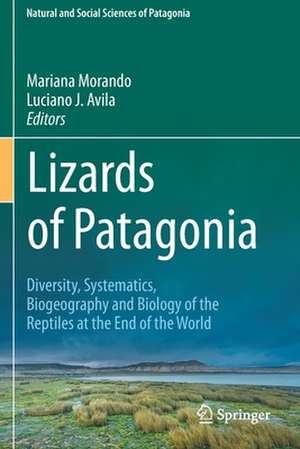Lizards of Patagonia: Diversity, Systematics, Biogeography and Biology of the Reptiles at the End of the World: Natural and Social Sciences of Patagonia
Editat de Mariana Morando, Luciano J. Avilaen Limba Engleză Paperback – 25 aug 2021
| Toate formatele și edițiile | Preț | Express |
|---|---|---|
| Paperback (1) | 1382.17 lei 6-8 săpt. | |
| Springer International Publishing – 25 aug 2021 | 1382.17 lei 6-8 săpt. | |
| Hardback (1) | 1393.72 lei 6-8 săpt. | |
| Springer International Publishing – 25 aug 2020 | 1393.72 lei 6-8 săpt. |
Preț: 1382.17 lei
Preț vechi: 1685.57 lei
-18% Nou
Puncte Express: 2073
Preț estimativ în valută:
264.47€ • 276.16$ • 218.39£
264.47€ • 276.16$ • 218.39£
Carte tipărită la comandă
Livrare economică 15-29 aprilie
Preluare comenzi: 021 569.72.76
Specificații
ISBN-13: 9783030427542
ISBN-10: 3030427544
Ilustrații: XX, 432 p. 112 illus., 99 illus. in color.
Dimensiuni: 155 x 235 mm
Greutate: 0.63 kg
Ediția:1st ed. 2020
Editura: Springer International Publishing
Colecția Springer
Seria Natural and Social Sciences of Patagonia
Locul publicării:Cham, Switzerland
ISBN-10: 3030427544
Ilustrații: XX, 432 p. 112 illus., 99 illus. in color.
Dimensiuni: 155 x 235 mm
Greutate: 0.63 kg
Ediția:1st ed. 2020
Editura: Springer International Publishing
Colecția Springer
Seria Natural and Social Sciences of Patagonia
Locul publicării:Cham, Switzerland
Cuprins
Section I - Historical and general background -1) History of Discovery of the Patagonian Lizards.- 2) Lizards within the cultural and symbolic context of Patagonia.- Section II - Land, climate and vegetation background - 3) Landscapes and geology, a general introduction to the land of reptiles.- 4) Paleoclimatology of Patagonia since the Cretaceous to the Holocene .- 5) Geographical singularities of the Patagonian climate.- 6) Major phytogeographic units of Patagonia.- 7) The Patagonian fossil lizards.- Section III - Diversity and current knowledge of Patagonian lizards - 8) Naming the diversity: taxonomy of current species of Patagonian lizards.- 9) Phylogenetics, phylogeography and biogeography of Patagonian Steppe lizards.- 10) Phylogeography of lizards in Chile: the role of the history of geographic space on the distribution of its intraspecific diversity.- 11) General ecology of Patagonian lizards.- 12) Reproductivebiology of lizards from cold and harsh environments of Patagonia Argentina.- 13) Effects of global warming on ecophysiology of lizards of Patagonia, Argentina.- 14) Conservation of lizards from Patagonia: current status, trends and management proposals.
Recenzii
“The subtitle of the book refers to the ‘Reptiles at the End of the World.’ To me, phrases like this, commonly applied to Patagonia, give an almost apocalyptical impression … . Let’s hope that the end of world applies only in its geographical connotation, and that future researchers can use this book as a road map for the benefit of Patagonian lizards and other species in this wonderful and vast region of the world.” (Juan D. Daza, Herpetological Review, Vol. 53 (3), 2022)
Notă biografică
Dr. Mariana Morando is a Principal Researcher at the National Research Council of Argentina, working at the Instituto Patagónico para el Estudio de los Ecosistemas Continentales of Puerto Madryn, Chubut, and Professor of Evolution and Genetics at the Universidad Nacional de la Patagonia San Juan Bosco. She completed her basic studies at the Universidad Nacional de Río Cuarto in 1994, a Master at Brigham Young University (BYU, USA) in 2003, her PhD at Universidad Nacional de Tucumán in 2004 (Argentina), and a postdoctoral leave at BYU in 2014-2015. Her research focuses on phylogenetic and phylogeographic aspects of the Patagonian and northwestern lizard fauna of Argentina, mainly using molecular markers. She has authored or co-authored 117 peer-reviewed papers.
Dr. Luciano Javier Avila is a Principal Researcher at the National Research Council of Argentina working at the Instituto Patagónico para el Estudio de los Ecosistemas Continentales of Puerto Madryn, Chubut. He completed his undergraduate studies at the Universidad Nacional de Río Cuarto in 1990, his PhD at the Universidad Nacional de Tucuman in 1996 and a postdoctoral stay at Brigham Young University (USA) in 2000-2004. His research focuses on the taxonomy, phylogeny and natural history of the southern South American Herpetofauna. He is the author or co-author of 195 articles and notes on species limits, phylogenies, phylogeographies, bioinventories, biogeography, spatial ecology and natural history (including 90 peer-reviewed articles), nearly 80% of which involved Patagonian lizards.
Textul de pe ultima copertă
This book presents a critical and integrated review of lizards from Patagonia. It summarizes the region’s geomorphological history and climatic aspects, which makes it possible to interpret, from an evolutionary perspective, the latest findings on the various natural history aspects of its lizard fauna. As such, the book will appeal to all researchers and professionals specialized in lizard ecology and evolution.
Caracteristici
This is the first major review in this field in the last two decades Identifies general patterns in several co-distributed lizard species Focuses on lizards, which are one of the most important taxa in desert regions, and whose population dynamics are indicative of climate change





